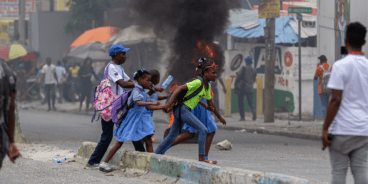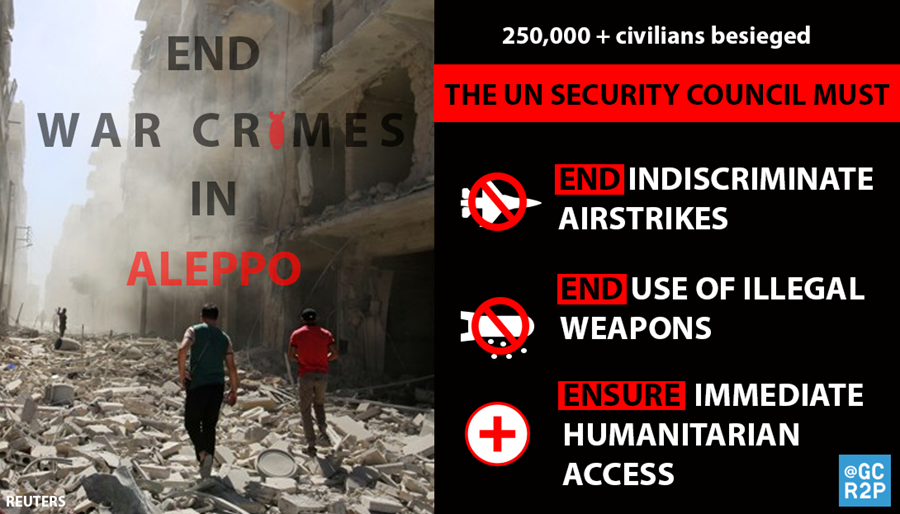Atrocity Alert No. 24: Aleppo, Syria
Atrocity Alert is a weekly publication by the Global Centre for the Responsibility to Protect highlighting and updating situations where populations are at risk of, or are enduring, mass atrocity crimes.
Aleppo, Syria
Following the collapse of the cessation of hostilities in Syria early last week, on 22 September the government launched a renewed offensive against rebel-held east Aleppo. For the past six days Russian and Syrian aircraft have conducted sustained and indiscriminate airstrikes, including with illegal barrel bombs, cluster munitions and the first documented use of “bunker-buster” bombs in Syria. More than 200 people, including 96 children, have reportedly been killed by these airstrikes. On Tuesday, 27 September, the government escalated their campaign with an unprecedented ground assault on eastern Aleppo.
Airstrikes have severely inhibited relief efforts for the more than 250,000 people who remain trapped in Aleppo. Since 22 September three Syrian Civil Defense (White Helmet) humanitarian rescue centers in east Aleppo have been destroyed and earlier today, 28 September, two of the largest hospitals in east Aleppo were hit by airstrikes. The World Health Organization estimates that only 35 doctors remain inside east Aleppo and that the 25 remaining health facilities are “on the verge of complete destruction.”
On 25 September France, United Kingdom and United States called an emergency UN Security Council meeting on the situation, during which the Ambassadors of France and the United Kingdom accused Russia and the Syrian government of committing war crimes in Aleppo. The Secretary-General’s Special Envoy for Syria, Staffan De Mistura, declared that in his 46 years at the UN, he had “never seen anything to match the horrors” of Aleppo. The Ambassadors of France, United Kingdom and United States walked out of the meeting during remarks by the Syrian Ambassador.
The renewed assault on east Aleppo represents a deliberate campaign to obliterate the rebel-held part of the city. Indiscriminate bombing, the targeting of humanitarian workers and intentional starvation of civilians all constitute war crimes.
Aleppo is not the only besieged city in Syria, nor is it the only city in which Syrian populations are facing atrocities. Nevertheless, alleviating civilian suffering and ending war crimes in east Aleppo is the biggest moral challenge facing the UN Security Council and the international community in the world today.
After five and a half years of atrocities and conflict, the international community and UN Security Council must end indiscriminate airstrikes against civilians, end the use of cluster munitions and other illegal weapons, and ensure unrestricted humanitarian access to all besieged populations.
Read Next

Atrocity Alert No. 436: Haiti, Myanmar (Burma) and Syria

Atrocity Alert No. 434: Sudan, Ethiopia and the UN Human Rights Council

